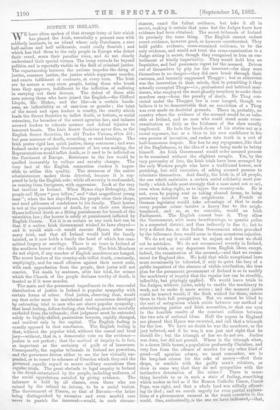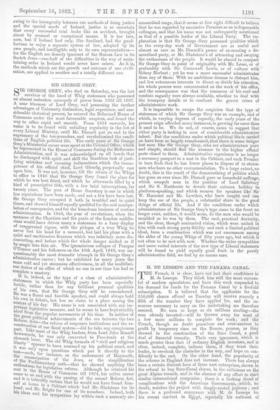JUSTICE IN IRELAND.
WE have often spoken of that strange irony of fate which has placed the Irish, essentially a peasant race with soldierly instincts, in an island where only Dutchmen, a race half-sailors and half milkmaids, could really flourish ; and which has tied them to the only people in Europe who detest their creed, scorn their peculiar vices, and do not clearly understand their special virtues. The irony extends far beyond politics, and is especially visible in the field of criminal justice. The copartnership between the nations impedes the doing of justice, common justice, the justice which suppresses murder, and exacts fulfilment of contracts, at every turn. The Irish are by nature a very stern people, hating those who break laws they approve, indifferent to the infliction of suffering in carrying out their decrees. The defect of those able men among them who have joined the English—the Clifford Lloyds, Mr. Blakes, and the like—is a certain harsh- ness, an inflexibility as of cast-iron or granite ; the taint of the secret and open leaders is cruelty, the cruelty which leads the Secret Societies to inflict death, or torture, or social ostracism, for breaches of the secret agrarian law, and induces avowed leaders to tolerate menace and defend injuries to innocent beasts. The Irish Secret Societies never fine, as the English Secret Societies, the old Trades Unions, often did ; but pass sentence of death, wounding, or cruel beatings. The Irish prefer rigid law, quick justice, sharp sentences ; and were Ireland under a popular Government of her own making, the Representatives would inflict death, us it used to be inflicted on the Continent of Europe. Resistance to the law would be quelled inexorably by volleys and cavalry charges. The very fact of the English connection renders it impos-
sible to utilise this quality. The sternness of the native administrators makes them detested, because it is sup- posed to help the English rule ; while all severity is confounded, as coming from foreigners, with oppression. Look at the very last incident in Ireland. When Hynes slays Doloughty, the people call Hynes " poor fellow," and " that magnificent young man "; when the law slays Hynes, the people close their shops, and send addresses of condolence to his family. Their horror is not at the punishment of death, for on their own theory Hynes inflicted death as a fitting punishment for breach of the unwritten law ; the horror is solely at punishment inflicted by English Courts. Yet it is as certain as any such fact can be that if a native Irish Government wished its laws obeyed— and it would wish—it would execute Hynes, after sum- mary trial, and that all Ireland would hold the family tainted, as it now holds a family the head of which has com- mitted forgery or sacrilege. There is no trace in Ireland of the southern horror of the death penalty. The Irish Members do not object, if any number of English murderers are hanged. The secret leaders of the country-side inflict death, constantly, unpityingly, and for small offences against their secret code, with such approbation from the people, that juries will not convict. Yet death by sentence, after fair trial, for crimes which the Church of the people declares worthy of death, is treated as if it were murder.
The main and the permanent impediment to the successful distribution of justice in Ireland is popular sympathy with certain forms of crime. Cool jurists, observing that, would say that order must be maintained and conscience developed by entrusting trial to men who are above popular sympathy ; that local feeling, fellow-feeling, clan feeling, must be carefully excluded from the tribunals ; that judgment must be entrusted solely to highly-skilled, passionless lawyers, rapidly changed, and resident only in the capital. The English feeling is exactly opposed to that conclusion. The English feeling is that, without the popular trial, without the casual and local jury—without, that is, a democratic vote on the evidence— justice is not perfect ; that the method of inquiry is, in fact, as important as the certainty of guilt or of innocence. Consequently, the regular tribunals in Ireland are powerless, and the governors driven either to see the law virtually sus- pended, or to resort to schemes of Coercion which they and the governed equally regard as nearer military executions than regular trials. The great obstacle to legal enquiry in Ireland is the dread entertained by the people, including sufferers, of the social opprobrium entailed by giving evidence, The i informer is held by all classes, even those who are ruined by the refusal to inform, to be a social traitor. The Government of France, or that of Bavaria—the latter being distinguished by excessive and even morbid care never to punish the innocent—would, in such circum-
stances, exact the fullest evidence, but take it all in secret, making it certain that none but the Judges knew how evidence had been obtained. The secret tribunals of Ireland do precisely the same thing. The English cannot endure secret evidence, however good, or however corroborated. They hold public evidence, cross-examined evidence, to be the only evidence, and would not trust the cross-examination to a Judge sitting in secret, though they recognised in him an em- bodiment of kindly impartiality. They would hold him an Inquisitor, and feel passionate regret for the accused. Driven i out of themselves by pity for the innocent—for .they were themselves in no danger—they did once break through their customs, and instantly suppressed Thuggee ; but so abhorrent, was the innovation to their minds, that in permitting it they actually exempted Thugs—i.e., professional and habitual mur- derers, who employed the most ghastly treachery to make their murders easy—from the penalty of death. No Thug con- victed under the Thuggee law is ever hanged, though we believe it to be demonstrable that no conviction of a Thug was ever made on doubtful grounds. There is, probably, no country where the evidence of the accused would be so valu- able as Ireland, and no man who could stand acute cross- examination so little as the Irishman of the class usually implicated. He feels the break-down of his stories not as a moral exposure, but as a blow to his own confidence in his own powers of invention, and rushes into truth in a sort of half-humorous despair. Nor has he any repugnance, like that of the Englishman, to the idea of a man being made to betray himself. An Irish Government would order accused persons to be examined without the slightest scruple. Yet, by the very perversity of fate, the Irish trials have been arranged by the only Western people who have a traditional horror, now perishing, but still executive, of asking accused persons to criminate themselves. And finally, the Irish is, of all people,. the one which maintains a certain social solidarity most per- fectly ; which holds most strongly that a man must not so act, even when doing right, as to injure the country-side. He is not, even by paying rent or taking cleared farms, to bring pecuniary mischief on his neighbours. A French or German legislator would take advantage of that to make. every popular crime involve a heavy fine to the neigh- bourhood, and so, as we conceive, would an Irish Parliament. The English cannot bear it. They allow the Government, with many heartburnings, to quarter police in a suspected district, and thus indirectly to fine it ; but to levy a direct fine, as the Indian Government when provoked by the tribesmen does, would seem to them monstrous injustice.
We do not say it would not be unjust, and trust we shall not be mistaken. We do not recommend severity in Ireland, or secret trials, or any departure from English ideas, except, indeed, the examination of the accused,—and that we recom- mend for England also. We hold that while exceptional laws must occasionally be tolerated, if only to quiet the fury of a public impatient of the absence of visible retribution, the true plan for the permanent government of Ireland is so to modify the machinery of inquiry that the regular law can be steadily, inflexibly, but pityingly applied. We would leave trials to. the Judges, without juries, solely to enable the machinery to work, not to make it more severe ; and the moment juries could be trusted would, if the Irish wished for them, restore them to their full prerogatives. But we cannot be blind to the sort of antagonism which exists between our method of administering justice and Irish necessities, or shut our eyes to the horrible results of the constant collision between the two sets of national ideas. Half the papers in England are pleased that Hynes was executed, and call that a triumph for the law. We have no doubt he was the murderer, as the jury believed, and if he was, it was just and right that he should die ; but the triumph of law we do not see. Justice was done, but did not prevail. Where is the triumph when, in a dozen little towns, a population professedly Christian, and very free from the offence of murder for any other kind of greed—all agrarian crimes, we must remember, are in the long-last crimes for the sake of money—shut their shops, or condole with the guilty man's relatives, or show in some way that they do not sympathise with the
instinctive detestation of the crime I There is some- thing horrible to us in such a state of feeling, something which makes us feel as if the Roman Catholic Canon, Canon Pope, was right, and that a whole land was wilfully affront- ing its God ; and we search eagerly for even partial explana- tions of a phenomenon unusual in the worst countries in the world. One, undoubtedly, is the one we have indicated,—that,
owing to the incongruity between our methods of doing justice and the special needs of Ireland, justice is so uncertain that every successful trial looks like an accident, brought about by unusual or exceptional means. It is too late, now, but if Ireland had only, like Scotland, had the good- fortuno to enjoy a separate system of law, adopted by its own people, and intelligible only to its own representatives— for the English are densely ignorant of the Roman Law in its Scotch dress—one-half of the difficulties in the way of main- taining order in Ireland would never have arisen. As it is, the methods which are the growth and outcome of one civili- sation, are applied to another and a totally different one.































 Previous page
Previous page